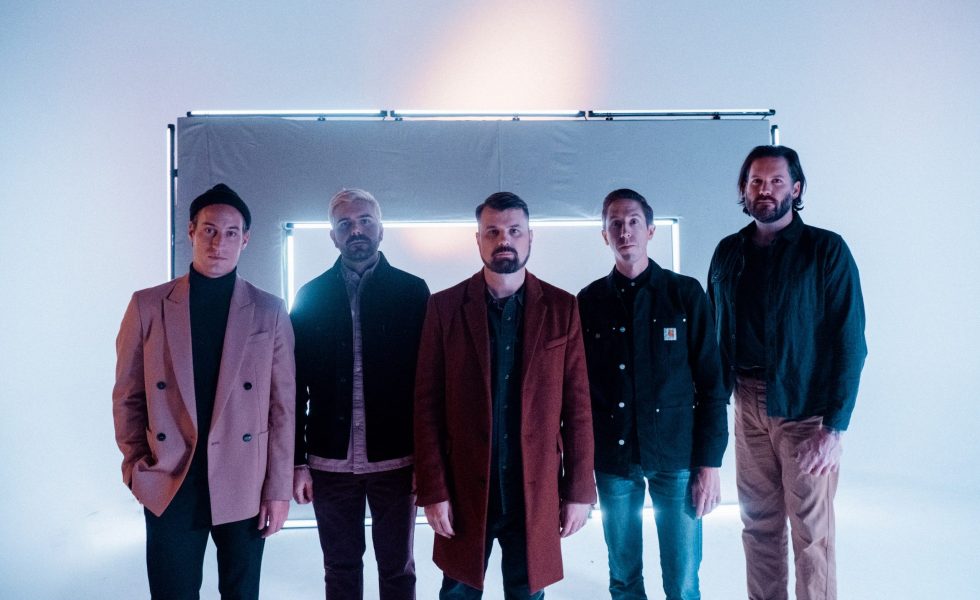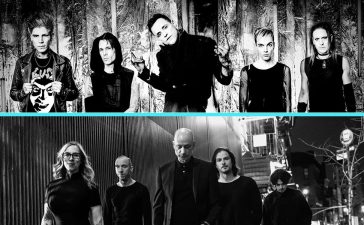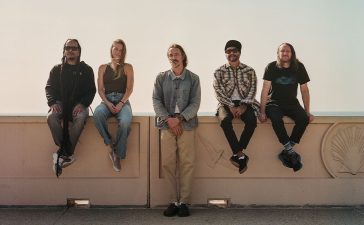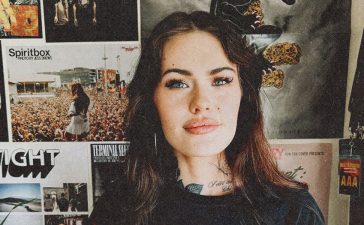The first half of 2020 would contain several key months for Canada’s Silverstein. Not just on account of their new record A Beautiful Place To Drown – though that was many months of work and planning, but also due to their 20th anniversary as a band falling within this period.
Both were to be celebrated together – a brand new album release scheduled to coincide with the anniversary. It was two years in the making. 40 shows across North America booked, routing organised, crews, logistics and support roles all locked in. Two and a half hour sets penned and rehearsed.
Then, mere days after A Beautiful Place To Drown’s Friday, 6th March release date and a handful of shows into the tour, the brakes were slammed as a global pandemic loomed. Though cruel and unfortunate, the timing makes Silverstein an interesting case study into the harsh reality of being a band in the time of COVID-19, and how the way we do things in the music industry may have changed forever.
By many metrics, Friday, 6th March was the last day of so called “normal life”, potentially forever: Italy had recorded fewer than 200 deaths, the UK had just one confirmed, and on this day President Trump infamously declared the virus a hoax, one that would simply “Go away.”
By the following week, multiple territories across the world had declared a state of emergency and even Trump had changed his tune; We’d been “blind-sighted” by the virus, he huffed.
“It’s pretty crazy how much happened in seven days,” Silverstein drummer and manager Paul Koehler recalls to Blunt Magazine. “Everything was changing so dramatically that you didn’t really know…”
“In the span of one week, we went from celebrating the album release in New York City, a sold out show of 1,500 people…Then we’re turning the bus around to come back to Canada because our Prime Minister is saying that he’s closing the border.”
“It was basically another four or so days until shows completely stopped in North America. Watching my friends play those shows was cringeworthy.”
In the moments prior to Canadian Prime Minister Justin Trudeau’s call to close the borders, Silverstein, just like many others, attempted to mind-over-matter the situation, theorising some shows will be canceled, but ultimately the tour would go on.
“Then I walked into that grocery store…” Paul says. “I think I saw one of my bandmates on the walk back. I said, ‘Yeah, we’re going home.’
Despite the explicit confirmation from contacts in Georgia, Florida and Texas that the shows could go ahead in their respective cities, Silverstein decided to ‘call it early’, as Paul puts it: “We could’ve done two more shows, but we pulled the plug. Because we didn’t want to be part of the problem, we wanted to be part of the solution.”
“The week after was going to be Texas. I was emailing with the promoter that day, and they were like, ‘Yeah, they haven’t shut us down yet, we’re still allowed to have shows.’ And I’m like, ‘This is weird. How come every other state is closing down, but you guys aren’t?’
“Nothing was coordinated…”
“It was basically another four or so days until shows completely stopped in North America. Watching my friends play those shows was cringeworthy. Just seeing photos and videos, at that time, it was so devastating.”
The logistics of sending the band and their crew home were staggering. With heavy hearts, Paul informed all crew that they would be going home early, and the tour, with dozens of shows remaining, was scrapped.
“We went to our bus driver, and said, ‘Yeah, we need to turn this thing around.’ He said, ‘Honestly, I can’t believe you guys held out this long…You’re the last bus in our entire company that’s running right now.’
“It was the biggest blow we’ve ever had. We’ve been a band for 20 years, never cancelled a tour, ever. It felt so out of control. And we were just like,’ what now?’
“…That’s where we entered lockdown.”
“Certain genres were down 20% to 30%, streaming numbers dipped for everybody.”
Perhaps one of the biggest misnomers around lockdown was that it was the creatives’ time to shine. Without the distractions of every day life, content creators had a captive audience. However, the reality couldn’t be further from the truth. Without the real-world elements to support their output, lockdown for many artists felt much like going out of the frying pan and into the fire.
“I don’t know how much people looked at it, but [music] streaming took a big hit in the three to four weeks after the tipping point of mid-March. Certain genres were down 20% to 30%. Streaming numbers dipped for everybody.”
“It hurts even a band with a brand new record. Because the weeks following the release is when you have your peak. Regardless of what you do in the next two years, between albums, the peak happens when you drop the album, you never get that peak again. So our peak was diminished. Numbers dropped for us. They dropped for rock [music] as a whole, significantly.”
It wasn’t for some time, around 12 weeks according to Paul, that music streaming numbers would once again balance out.
Without tours or streaming – two key traditional systems of modern band life, Silverstein, like many of their peers, found themselves in a precarious position to stick-and-move in order to salvage their craft, without shifting peoples’ focus too far from the important issue of survival during a pandemic. A road that would ultimately lead to their mini-doco, Quaranstein.
“One key priority for us, I acknowledged it early on: We need to be there for the fans now more than ever. Whether it’d simply be me tweeting, ‘Hey, stay home so we can tour again. Stay safe.’ Then producing content and quality that upholds the standards of stuff we would want to do regardless.
“That was our mission statement the whole time, was that we didn’t want to rush. There was a lot of noise, especially in those first four weeks. Everybody and their brother was going live on Instagram. It was a very crazy time.”
Silverstein entered the livestream wild ruckus with a solo acoustic performance with frontman Shane Told, pulling out all the stops – cameras, lighting, sound gear, promotion – to ensure a high standard of quality, effectively separating them from the livestream pack.
“Then we were like, ‘Okay, let’s do an at home concert’. It was a ton of fun. It was a great distraction from all this, and it gave me a project to do again that was uplifting; Using my energy for good.
“We got all this stuff together, we were like, you know what? We’re going to toss it to our friend, who’s a really creative filmmaker, and just let him go crazy with it. And he started doing this in like Arrested Development style. We even had our album producer mix the audio.”
“I think it really reinforces that rainy day mentality…A lot of us didn’t have it.”
The planning, plotting and polishing paid dividends for Silverstein, who naturally used fans’ live comment feed as a litmus test for the concept. As Paul reports, the feed was “just a lot of people just feeling comforted, and a positive distraction, with something that they were really able to enjoy. That’s what we wanted to do.”
As the world begins to thaw from the lockdown hibernation, Silverstein, like many of their peers, are now cautiously re-upping conversations about moving forward. But after seeing first hand how in just seven days, years of planning can go out the window, it would be foolish to ever rely on the traditional systems of modern band life ever again.
“I think it really reinforces that rainy day mentality,” Paul says. “A lot of us didn’t have it. You’re forced to look inward and re-evaluate things, and try to find something else out there that can help propel you out of it.
“It’s a real challenge, but I think this is just going to make everyone be a lot more creative. I think there’s already been a lot of disruption, and rock music has been the last to really adhere to it. But the idea of surprise releases, and more single drops, and more collaborations…
People need to realise, it’s not going to be like, one day, ‘okay, all the tours are back on’. It’s like, ‘well now you have every artist in the entire universe needing to get back to work’. We all have to work together. It’s tough..
I think creativity and community are hopefully the two big things that we can pull out of this. And that hopefully makes us better musicians and better people.”








